STEEP Newsletter 2024 Issue 1
Voices from STEEP
“We have documented some of the negative consequences, and we send the message back to you: please learn the lesson.”
Pal Weihe, PhD, Professor, University of the Faroe Islands; Head, Department of Occupational Medicine and Public Health; STEEP Clinical Lead, Project 2
STEEP leads Pal Weihe, PhD, Laurel Schaider, PhD, and Philippe Grandjean, PhD, were interviewed by Bloomberg Investigates Tiffany Kary for the PFAS documentary The Poison in Us All. This powerful look at the impact of PFAS was featured on Reddit Ask Me Anything Series, where STEEP researchers answered PFAS questions from around the world.

A Note of Thanks: This edition of the STEEP Newsletter was co-written and co-edited by Matt Dunn, PhD, former STEEP trainee. Dunn now works for RPS as a Contaminant Modeler, but moonlights as a freelance writer and editor. We were grateful to passively sample some of his time (that’s a PFAS joke).
 Feature
Feature
A Wonderful Jigsaw Puzzle: Science Communication According to Dr. Chris Reddy
 Challenges abound for a scientist engaged in active research. At the end of the day, no matter the field of science, there is no handbook for the management of this litany of anxiety-inducers and a foremost tenet of research: science communication. Dr. Chris Reddy, a University of Rhode Island Graduate School of Oceanography (URI GSO) alumni and Senior Scientist at the Woods Hole Oceanographic Institution (WHOI) took some time to sit down with STEEP and ponder these very stresses and science communication struggles.
Challenges abound for a scientist engaged in active research. At the end of the day, no matter the field of science, there is no handbook for the management of this litany of anxiety-inducers and a foremost tenet of research: science communication. Dr. Chris Reddy, a University of Rhode Island Graduate School of Oceanography (URI GSO) alumni and Senior Scientist at the Woods Hole Oceanographic Institution (WHOI) took some time to sit down with STEEP and ponder these very stresses and science communication struggles.
“There’s a perception out there that science communication is just checking a box. If you come from the mindset that it is a chore, it’s a real missed opportunity. The times when I’m at the lowest is when communicating science lifts me; that’s my life preserver.”
Join STEEP on March 28! Chris Reddy, Senior Scientist at WHOI: Communicating Science in a Crisis
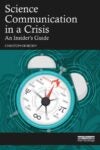 One of the world’s foremost oil spill scientists, Chris Reddy, Ph.D. ‘98, is coming back to the University of Rhode Island Narragansett Bay Campus on Thursday, March 28th, 3:30-4:45pm.
One of the world’s foremost oil spill scientists, Chris Reddy, Ph.D. ‘98, is coming back to the University of Rhode Island Narragansett Bay Campus on Thursday, March 28th, 3:30-4:45pm.
Reddy’s book, Science Communication in a Crisis: An Insider’s Guide (Routledge, 2023) identifies the principal challenges that scientists face when communicating with different stakeholder groups and offers advice on how to navigate the maze of competing interests and deliver actionable science when the clock is ticking.
Reddy has responded to numerous oil spills and other environmental crises over his 25-year career and serves as Senior Scientist at Woods Hole Oceanographic Institution (WHOI). Reddy is a faculty member of the MIT/WHOI Joint Program in Oceanography and Engineering and has been a Ph.D. committee member for numerous EAPS and CEE graduate students. He has published over 220 peer-reviewed manuscripts and holds 12 U.S. Patents. Chris has testified before the U.S. Congress five times, written more than 30 opinion pieces, and given hundreds of interviews for print, radio, and television. Reddy’s scientific discoveries are heavily recognized by the American Chemical Society’s Grady-Stack Award, the AGU Ambassador Award, the Clair C. Patterson Award, and the Aldo Leopold Fellowship.
More information and to register.
 Community Engagement
Community Engagement

Tested Tips for Trainees
Helpful tip #547: Never start an experiment on Friday, because everything will go wrong.
Melissa Woodward, PhD candidate (University of Rhode Island) and STEEP social media coordinator, recently launched STEEP Trainee’s Grad School Survival Guide, a social media series featuring funny anecdotes and practical tips for collaborating and time management.
Follow STEEP on our socials for a laugh and some valuable insight: steepsuperfund
Engagement on the Ground
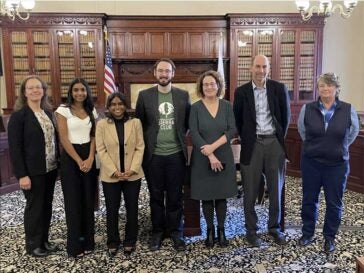 Community Engagement Core (CEC) co-Lead and Senior Scientist at Silent Spring Institute (SSI), Laurel Schaider, PhD, has been actively engaged in community events to educate on PFAS in the environment.
Community Engagement Core (CEC) co-Lead and Senior Scientist at Silent Spring Institute (SSI), Laurel Schaider, PhD, has been actively engaged in community events to educate on PFAS in the environment.
- October, 2023: Schaider gave a PFAS presentation at Snow Library in Orleans, Massachusetts: “Forever Chemicals” and your health: What do we know about PFAS and what are the concerns? The talk provided an overview of PFAS exposures and health concerns, PFAS in drinking water on Cape Cod, and tips for reducing exposures and taking action.
- October, 2023: Joined by René LaPointe Jameson, Research Assistant at SSI, and Cheryl Osimo, Executive Director of the Massachusetts Breast Cancer Coalition and Cape Cod Coordinator at SSI, Schaider presented at the second day of the 2023 EPA Region 1 Tribal Environmental Conference in Hyannis, Massachusetts. This conference was co-hosted by the Mashpee Wampanoag Tribe and the EPA Region 1, and included diverse environmental discussions, presentations, and cultural events shared by Tribal Leaders, Tribal Environmental Directors and Staff, Tribal Historic Preservation Officers, Tribal Elders, students, and EPA leadership and staff. Schaider presentedCommunity engagement and PFAS testing in local fish and shellfish: A collaboration between the Mashpee-Wampanoag Tribe and the URI STEEP Superfund Research Program, on PFAS contamination of drinking water in Cape Cod and STEEP CEC’s various collaborative projects with the Mashpee Wampanoag Tribe.
- November, 2023: Schaider presented at the Massachusetts State House as part of a briefing organized by Clean Water Action related to the Toxic Free Kids bill. This presentation, Addressing Exposures to Toxic Chemicals in Children’s Products, provided an overview of health effects of everyday chemicals–including PFAS–on children. On the same day, Schaider also met with two researchers from the Joint Committee on Public Health to discuss PFAS related to a comprehensive bill on PFAS currently being considered by the Massachusetts legislature.
- January, 2024: Schaider presented “Forever Chemicals” and your health: What do we know about PFAS and what are the concerns? at PFAS Chemicals in Duxbury Water: Understanding the Health Risks & Solutions. The presentation included an overview of PFAS exposures and health effects, PFAS in drinking water, and tips for reducing exposures and taking action.
 Research Highlights
Research Highlights
Liddie Launches PFAS Statewide Sampling Interactive Map
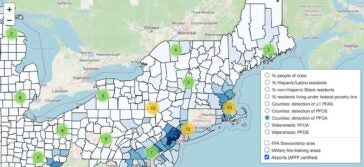 In 2023, STEEP Trainee and PhD candidate Jahred Liddie (Harvard University) developed and launched the PFAS Statewide Sampling Interactive Map. Created as an extension of Liddie et al., 2023, the map compiles data from 24 statewide monitoring campaigns of approximately 9,900 community water systems from 2016 to 2023, capturing PFAS drinking water data, county-level sociodemographic factors, and data on PFAS contamination sources. Municipalities, researchers, and NGOs have accessed and used this data for targeted analyses. Development assisted by Elsie Sunderland, PhD at Harvard University (STEEP Lead, Project One: Exposure) and Laurel Schaider, PhD at Silent Spring Institute (STEEP Co-Lead, Community Engagement Core). A follow-up webinar discussed the research in greater detail.
In 2023, STEEP Trainee and PhD candidate Jahred Liddie (Harvard University) developed and launched the PFAS Statewide Sampling Interactive Map. Created as an extension of Liddie et al., 2023, the map compiles data from 24 statewide monitoring campaigns of approximately 9,900 community water systems from 2016 to 2023, capturing PFAS drinking water data, county-level sociodemographic factors, and data on PFAS contamination sources. Municipalities, researchers, and NGOs have accessed and used this data for targeted analyses. Development assisted by Elsie Sunderland, PhD at Harvard University (STEEP Lead, Project One: Exposure) and Laurel Schaider, PhD at Silent Spring Institute (STEEP Co-Lead, Community Engagement Core). A follow-up webinar discussed the research in greater detail.
STEEP Researchers Find Small RI River May Pose a Big PFAS Problem
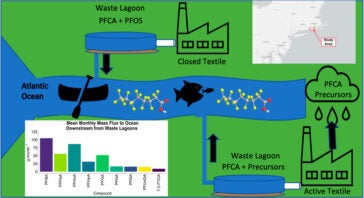 In research, textiles and PFAS have long been intertwined. Yet the public understanding of this connection is less obvious, even more so considering that river-side textile mills have existed far longer than our knowledge of PFAS. A recent study by STEEP researchers suggests that both active and shuttered textile mills along a small river in Rhode Island transport a large amount of PFAS to the Atlantic. Read More…
In research, textiles and PFAS have long been intertwined. Yet the public understanding of this connection is less obvious, even more so considering that river-side textile mills have existed far longer than our knowledge of PFAS. A recent study by STEEP researchers suggests that both active and shuttered textile mills along a small river in Rhode Island transport a large amount of PFAS to the Atlantic. Read More…
PFAS in Groundwater and Eel Emphasize Need for Standards
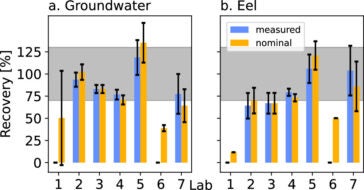 STEEP researchers collaborated with seven independent, international laboratories, representing academic, government, and commercial organizations, to compare extractable organoflourine and targeted PFAS measurements in groundwater and eel (Anguilla rostrata) from sites contaminated with fire-fighting foam. Overall, the comparison underscores the need for standard methods for sample extraction, instrumental analysis, and data processing. Read More…
STEEP researchers collaborated with seven independent, international laboratories, representing academic, government, and commercial organizations, to compare extractable organoflourine and targeted PFAS measurements in groundwater and eel (Anguilla rostrata) from sites contaminated with fire-fighting foam. Overall, the comparison underscores the need for standard methods for sample extraction, instrumental analysis, and data processing. Read More…
Mobile-Laboratory Experiments Assess PFAS in Fish, Mussels on Cape Cod
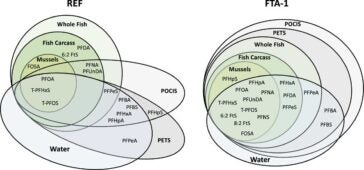 Aqueous film-forming foams (AFFF) were historically deployed for fire department training activities on Joint Base, Cape Cod, Massachusetts, and resulted in extensive groundwater PFAS contamination. In this study from STEEP researchers, PFAS concentrations in aquatic species, water, and samplers, a result of groundwater discharging to surface waters, were evaluated in mobile-laboratory experiments. Read More…
Aqueous film-forming foams (AFFF) were historically deployed for fire department training activities on Joint Base, Cape Cod, Massachusetts, and resulted in extensive groundwater PFAS contamination. In this study from STEEP researchers, PFAS concentrations in aquatic species, water, and samplers, a result of groundwater discharging to surface waters, were evaluated in mobile-laboratory experiments. Read More…
Combined with High-Fat Diet, PFOS Exposure Impacts Neurodevelopment in Mice
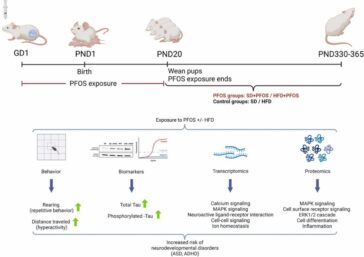 PFOS can affect several brain functions including memory, coordination, and social activity. Similarly, diets high in fat can impair cognition and increase risk for dementia. A study from STEEP researchers explores the relationship between PFOS exposure and a high-fat diet, demonstrating that the combination promotes repetitive behavior, hyperactivity and social withdrawal in mice. Read More…
PFOS can affect several brain functions including memory, coordination, and social activity. Similarly, diets high in fat can impair cognition and increase risk for dementia. A study from STEEP researchers explores the relationship between PFOS exposure and a high-fat diet, demonstrating that the combination promotes repetitive behavior, hyperactivity and social withdrawal in mice. Read More…
STEEP Researchers Track PFAS, Circulating, Cycling Worldwide
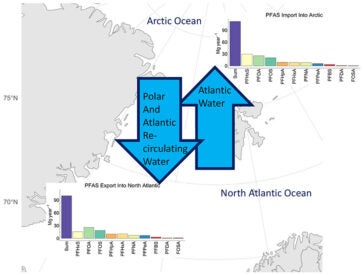 Evidence suggests PFAS in the remote northern hemisphere are the result of long-range transport in the air and ocean. STEEP researchers deployed passive samplers in the Fram Strait, a passage of water between Greenland and the Norwegian archipelago of Svalbard, with aims to understand PFAS there and assess if sources of PFAS are changing. Yes…and? The Arctic Ocean potentially exports as much PFAS to the North Atlantic Ocean as what enters it, re-circulating the contaminants around the world. Read More…
Evidence suggests PFAS in the remote northern hemisphere are the result of long-range transport in the air and ocean. STEEP researchers deployed passive samplers in the Fram Strait, a passage of water between Greenland and the Norwegian archipelago of Svalbard, with aims to understand PFAS there and assess if sources of PFAS are changing. Yes…and? The Arctic Ocean potentially exports as much PFAS to the North Atlantic Ocean as what enters it, re-circulating the contaminants around the world. Read More…
Bound and Unbound: Seeking to Understand PFAS in the Bloodstream
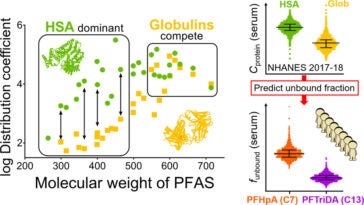 PFAS binds to blood serum proteins and impacts protein accumulation, circulatory distribution, and elimination. The unbound portion of PFAS, untouchable by biomolecules, can be transported to organs and recirculated in the bloodstream, and therefore more likely to elicit toxic effects. In a recent study, STEEP researchers investigated the competitive binding of PFAS to two major proteins and the dynamics of unbound PFAS in the human body. Read More…
PFAS binds to blood serum proteins and impacts protein accumulation, circulatory distribution, and elimination. The unbound portion of PFAS, untouchable by biomolecules, can be transported to organs and recirculated in the bloodstream, and therefore more likely to elicit toxic effects. In a recent study, STEEP researchers investigated the competitive binding of PFAS to two major proteins and the dynamics of unbound PFAS in the human body. Read More…
Other STEEP Publications
Baumert, B.O., Fischer, F.C., Nielsen, F., Grandjean, P., Bartell, S.M., Stratakis, N., Walker, D.I., Valvi, D., Kohli, R., Inge, T., Ryder, J., Jenkins, T., Sisley, S., Xanthakos, S., Rock, S., La Merrill, M.A., Conti, D., McConnell, R., Chatzi, L. 2023. Paired liver: plasma PFAS concentration ratios from adolescents in the Teen-LABS Study and derivation of empirical and mass balance models to predict and explain liver PFAS accumulation. Environmental Science & Technology 2023 57 (40), 14817-14826. [DOI: 10.1021/acs.est.3c02765]
Other Related Publications
Agerstrand, M., Arinaitwe, K., Backhaus, T., Barra, R.O., Diamond, M.L., Grimalt, J.O., Groh, K., Kandie, F., Kurt-Karakus, P.B., Letcher, R.J., Lohmann, R., Meire, R.O., Oluseyi, T., Schaffer, A., Septiono, M., Sigmund, G., Soehl, A., Sogbanmu, T.O., Suzuki, N., Venier, M., Vlahos, P., Scheringer, M. 2023. Key principles for the intergovernmental science-policy panel on chemicals and waste. Environmental Science & Technology 2023 57 (6), 2205-2208. [DOI: 10.1021/acs.est.2c08283]
Lohmann, R., Beatty, B., Graybill, J., Grigorieva, E., Hansen, K.L., Soikkeli, A., 2023. Perspective: Dimensions of Environment and Health in Arctic Communities. Environment & Health 2024 2 (1), 3-10. [DOI: 10.1021/envhealth.3c00116]
Schäffer, A., Groh, K.J., Sigmund, G., Azoulay, D., Backhaus, T., Bertram, M.G., Carney Almroth, B., Cousins, I.T., Ford, A.T., Grimalt, J.O., Guida, Y., Hansson, M.C., Jeong, Y., Lohmann, R., Michaels, D., Mueller, L., Muncke, J., Öberg, G., Orellana, M.A., Sanganyado, E., Schäfer, R.B., Sheriff, I., Sullivan, R.C., Suzuki, N., Vandenberg, L.N., Venier, M., Vlahos, P., Wagner, M., Wang, F., Wang, M., Soehl, A., Ågerstrand, M., Diamond, M.L., Scheringer, M., 2023. Conflicts of Interest in the Assessment of Chemicals, Waste, and Pollution. Environmental Science & Technology 2023 57 (48), 19066-19077. [DOI: 10.1021/acs.est.3c04213]
Yonis, S., Kahkashan, S., Adelman, D., Lohmann, R., 2023. Transects of polycyclic aromatic hydrocarbons and organochlorine pesticides in an urban estuary using passive samplers. Marine Pollution Bulletin, 2023 197, 115768. [DOI: 10.1016/j.marpolbul.2023.115768]
 Program Updates
Program Updates
STEEP Welcomes Cathy Dwyer as New Coordinator
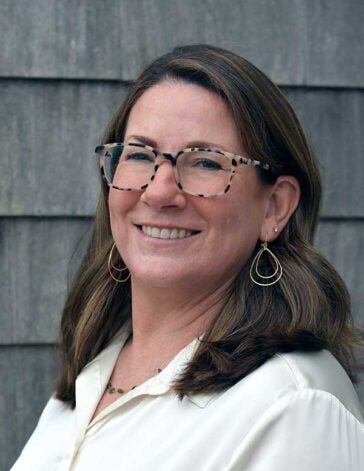 University of Rhode Island (URI) STEEP (Sources, Transport, Exposure and Effects of PFAS) Superfund Research Center welcomes Cathy Dwyer as STEEP Coordinator. In her role, Cathy will assist Center Director Rainer Lohmann with carrying out key administrative, financial, and management activities associated with the STEEP portfolio of projects.
University of Rhode Island (URI) STEEP (Sources, Transport, Exposure and Effects of PFAS) Superfund Research Center welcomes Cathy Dwyer as STEEP Coordinator. In her role, Cathy will assist Center Director Rainer Lohmann with carrying out key administrative, financial, and management activities associated with the STEEP portfolio of projects.
“I’m excited to undertake a role in helping STEEP move forward with its efforts to help communities address PFASs problems,” says Dwyer. “It will be rewarding to be part of the STEEP team and to know I am doing my part to help with solutions.”
Prior to coming on board STEEP, Cathy worked for 13 years at the URI Coastal Resources Center where she provided administrative, financial, and communications support to a variety of domestic and international efforts, including a $15 million United States Agency for International Development (USAID) initiative focusing on coastal sustainability in the Pacific Islands. Her grant management and project coordination experience provided significant support to research projects in Ghana, Senegal, Madagascar, and Rhode Island.
Grandjean Talk: Emergence of PFAS as an Environmental Toxicant
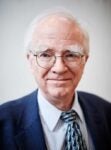 In September, Philippe Grandjean, PhD, and Project 2 Lead presented a live and streamed lecture to the research community. Emergence of PFAS as an Environmental Toxicant addressed the delay of crucial information about perfluorinated alkylate substances (PFAS) toxicity and the implications for human health. Recent research has identified adverse effects at lower and lower exposures. While most companies have stopped producing two forms of PFAS— perfluorooctanoic acid (PFOA) and perfluorooctane sulfonic acid (PFOS)—the chemicals persist in the environment, and new forms of PFAS are raising concerns. The emergence of PFAS illustrates crucial weaknesses of our chemicals control. Nearly 175 participants attended the lecture, live and over Zoom.
In September, Philippe Grandjean, PhD, and Project 2 Lead presented a live and streamed lecture to the research community. Emergence of PFAS as an Environmental Toxicant addressed the delay of crucial information about perfluorinated alkylate substances (PFAS) toxicity and the implications for human health. Recent research has identified adverse effects at lower and lower exposures. While most companies have stopped producing two forms of PFAS— perfluorooctanoic acid (PFOA) and perfluorooctane sulfonic acid (PFOS)—the chemicals persist in the environment, and new forms of PFAS are raising concerns. The emergence of PFAS illustrates crucial weaknesses of our chemicals control. Nearly 175 participants attended the lecture, live and over Zoom.
STEEP Collaborates with RI Dept. of Environmental Management
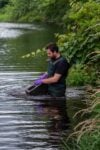 The State of Rhode Island Department of Environmental Management (RIDEM) Statewide PFAS Source Investigation Report, recently drafted, features a collaboration with former STEEP trainee, Matt Dunn (University of Rhode Island), around statewide PFAS source investigation, and how the data is being used to influence policy.
The State of Rhode Island Department of Environmental Management (RIDEM) Statewide PFAS Source Investigation Report, recently drafted, features a collaboration with former STEEP trainee, Matt Dunn (University of Rhode Island), around statewide PFAS source investigation, and how the data is being used to influence policy.
RI DEM worked with Dunn on the application of passive samplers for detecting PFAS concentrations atvarious locations along the Pawcatuck River, which boasts an extensive history of textile finishing operations, from headwaters at Worden Pond, South Kingstown, draining to Westerly and Long Island Sound. Samples were also collected from the former wastewater stabilization ponds at Bradford Dye. According to the report, “This data was utilized in the promulgation of the Surface Water Action Limit and may be used in the future to help identify potential releases and responsible parties along the Pawcatuck River.”
The PFAS report was featured in a recent ecoRI news story.
STEEP Beyond the Lab
You may have seen our team at events around the country over the last few months. Below we feature STEEP presentations at several prominent conferences.
Northeast Society of Toxicology Annual Meeting
October, 2023 | Shrewsbury, MA
- Kaye, E., et al. Gestational and lactational exposure to a PFAS mixture: PFOA, PFOS and PFHxS alter the neonatal liver transcriptome in CD-1 mice. WINNER: Best Student Oral Presentation
- Agudelo, J., et al. Evaluation of legacy and replacement PFAS in human livers banked over the past 20 years. WINNER: Third Place, Student Poster Presentation
Department of Defense’s Energy and Environment Innovation Symposium: Strategic Environmental Research and Development Program
November, 2023 | Arlington, Virginia
- Habtemichael, A., et al. From The Bottom Up: Deciphering Bioaccumulation And Biomagnification Of PFAS In Plankton.
- Nelson, R., et al. PFAS bioaccumulation in coastal seabirds from Charleston, SC.
Superfund Research Program Annual Grant Recipient Meeting
December, 2023 | Albuquerque, New Mexico

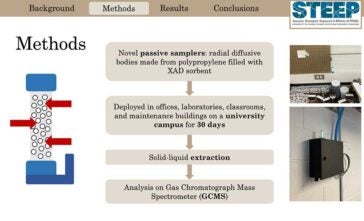
At the 2023 SRP meeting in New Mexico, Melissa Woodward, STEEP Trainee and PhD candidate (University of Rhode Island) presented Application of Novel Passive Samplers for the Detection of Persistent Organic Pollutants in Indoor Air, outlining research done in collaboration with Duke through her KC Donnelly Externship Award. Woodward’s work to develop easy-to-use tools for the detection of pollutants in the air involved their deployment around a university campus, demonstrating both their ability to measure a wide range of contaminants, and the potential of exposure to harmful air pollutants in the workplace.
- Agudelo, J., et al. Evaluation of legacy and replacement PFAS in human livers banked over the past 20 years.
- Diamond, E., Schaider, L., et al. STEEP Community Engagement Core: Evaluating & Communicating PFAS Contamination with Tribal Communities on Cape Cod.
- Kaye, E., et al. Developmental exposure to a PFAS mixture: PFOA, PFOS and PFHxS alters the neonatal liver transcriptome in mice.
- Skende, O., et al. Administration of apple juice concentrate decreases perfluorooctane sulfonic acid (PFOS) absorption in C57BL/6J male mice.
Partnerships for Environmental Public Health: Climate Change and Environmental Justice: Engaging Diverse Teams
February, 2024 | Durham, NC
- Neville, A., Witterschein, J., et al. Dynamic Trainee Engagement Enriching Community Outreach
Society of Toxicology Annual Meeting and ToxExpo
March, 2024 | Salt Lake City, UT
Angela Slitt, PhD, and Project 3 Lead, served as the Co-Chair for SOT Awards Committee, organized and led several symposia as chair and co-chair, and gave two talks: “Tackling Thousands of Perfluoroalkyl Substances (PFAS): Use of Rat Liver Tissue as a Surrogate to Predict PFAS Tissue Binding for Human and Mouse Tissues”; and “Integrating Drug Development Tools to Predict Key Mechanisms of Per- and Polyfluoroalkyl Elimination and Clearance”.
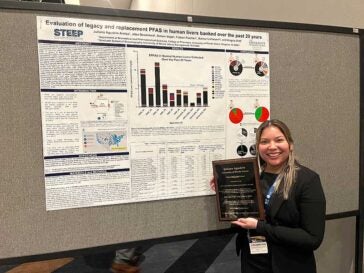 Agudelo, J., et al. Evaluation of legacy and replacement per- and polyfluoroalkyl substances (PFAS) in human livers banked over the past 20 years. WINNER: Best Student Abstract Award, John Doull Risk Assessment Endowment Award; FINALIST: Jane Ellen Simmons Travel Award. Agudelo also was a symposium speaker for the talk, “Integrating In Vitro Transport and Binding Data into Toxicokinetic Models to Elucidate the Mechanisms Driving Tissue Distribution and Elimination of Per- and Polyfluoroalkyl Substances in Humans”.
Agudelo, J., et al. Evaluation of legacy and replacement per- and polyfluoroalkyl substances (PFAS) in human livers banked over the past 20 years. WINNER: Best Student Abstract Award, John Doull Risk Assessment Endowment Award; FINALIST: Jane Ellen Simmons Travel Award. Agudelo also was a symposium speaker for the talk, “Integrating In Vitro Transport and Binding Data into Toxicokinetic Models to Elucidate the Mechanisms Driving Tissue Distribution and Elimination of Per- and Polyfluoroalkyl Substances in Humans”.- Kaye, E., et al. Gestational and lactational exposure to a PFAS mixture: PFOA, PFOS and PFHxS alters the neonatal liver transcriptome in CD-1 mice.
- Modaresi, S. Perfluorooctane sulfonate (PFOS) absorption, distribution and excretion into the liver is Fatty Acid Binding Protein (FABP) Independent.
- Skende, O. Apple juice administration reduces perfluorooctane sulfonic acid (PFOS) absorption in C57BL/6J mice.
Upcoming! Northeast Conference on The Science of PFAS: Public Health & The Environment
April, 2024 | Marlborough, MA
STEEP trainees Heidi Pickard, PhD candidate (Harvard University) and Melissa Woodward, PhD candidate (University of Rhode Island) are presenting.
 STEEP Trainee Feature
STEEP Trainee Feature
STEEP’s Izak Hill: Two Kinds of Fish Influencer
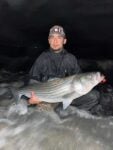 If you’ve been on social media recently you’ve likely heard the term “influencer” to describe popular content creators. Izak Hill, MS, is currently a STEEP trainee and University of Rhode Island (URI) doctoral student under the supervision of STEEP Director Rainer Lohmann, PhD, and Anna Robuck, PhD, former STEEP trainee and EPA Environmental Chemist. Hill was something of an up-and-coming influencer himself in the recreational fishing world, but for now, he won’t be posting on Instagram or telling you about his favorite bait; he will be influencing scientists, policy makers, and the public, while catching a few fish. Read More…
If you’ve been on social media recently you’ve likely heard the term “influencer” to describe popular content creators. Izak Hill, MS, is currently a STEEP trainee and University of Rhode Island (URI) doctoral student under the supervision of STEEP Director Rainer Lohmann, PhD, and Anna Robuck, PhD, former STEEP trainee and EPA Environmental Chemist. Hill was something of an up-and-coming influencer himself in the recreational fishing world, but for now, he won’t be posting on Instagram or telling you about his favorite bait; he will be influencing scientists, policy makers, and the public, while catching a few fish. Read More…
 STEEP Trainee Accomplishments
STEEP Trainee Accomplishments
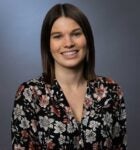 STEEP Trainee and PhD candidate Heidi Pickard (Harvard University) was honored as a 2024 Harvard Horizons Scholar. Harvard Horizons celebrates the ideas and innovations of PhD students at Harvard and helps them gain essential professional skills.
STEEP Trainee and PhD candidate Heidi Pickard (Harvard University) was honored as a 2024 Harvard Horizons Scholar. Harvard Horizons celebrates the ideas and innovations of PhD students at Harvard and helps them gain essential professional skills.
“My work is trying to sound the alarm,” Pickard says. “These precursors [pre-PFAS chemicals] we’ve assumed aren’t a problem, probably are. So, we need to include them in regular biomonitoring and conduct toxicity assessments to identify whether or not exposure to these types of chemicals is important for fish consumers.”
- Sangwoo Ryu defended and earned a PhD for his dissertation: “Evaluation of the Toxicokinetic Mechanisms of Perfluoroalkyl Substances: Accumulation, Distribution, and Elimination“
- Tatyana Yanishevsky defended and earned a M.S. for her thesis:“Carbon Filter Efficiency in Removing PFAS From Drinking Water In Barnstable, MA”
- Erasme Uzieye moved on from his role in STEEP as Postdoctoral Researcher in Project 4 and is now an Assistant Professor of Environmental Studies at Brevard College.
 Soundbites from STEEP
Soundbites from STEEP
“Lohmann confirmed that there are no federal air quality regulations for PFAS, and that foam fractionation will aerate the chemicals. However, he said this can be addressed if Casella uses carbon air filters to capture the chemicals, something researchers use in the lab. ‘…you just have to make sure you don’t release whatever PFAS are mobilized into the surrounding environment,’ he said.” – Rainer Lohmann, PhD, STEEP Director, as interviewed for Vermont Public Radio’s article, Locals skeptical of project to remove PFAS from leachate in Coventry.
“PFAS are like asbestos. We are facing a real health tragedy. That of perfluoroalkyl substances is a case of violation of human rights. Italy? It’s already late.” – Philippe Grandjean, PhD, STEEP Co-Director and Project 2 Lead, as featured in the Italian online magazine, byoblu: “HEALTH, THE SUPER WITNESS: “PFAS ARE LIKE ASBESTOS”.
“There’s a lot of concern now about uptake from PFAS now, particularly through fish.” – Rainer Lohmann, STEEP Director and Project 4 Lead, recently presented on passive samplers at the Eastern Analytical Symposium (EAS) in Princeton, New Jersey. An article in Chromatography Online, Passive Sampling for Testing PFAS in Water, gave a review of his presentation.
”You can think of [PFAS] as a big family tree, with many different members.” – Laurel Schaider, PhD, STEEP Community Engagement Core Co-Lead and Project 4 Lead, and senior scientist at the Silent Spring Institute, as quoted in the Slate Online article, How Worried Should We Be About “Forever Chemicals”? PFAS are in … so many things. Here are a few things to keep in mind.
Read the 2025 Issue 1 Newsletter
Read the 2024 Issue 2 Newsletter
Read the Spring/Summer 2023 Newsletter
Read the Winter 2022 Newsletter
Read the Spring 2021 Newsletter

